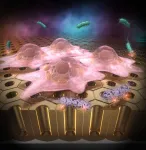(Press-News.org) Offering rewards helps people to stop smoking, with success rates continuing long after incentives have stopped.
The new research, led by the University of East Anglia, also explored whether incentives were effective in helping pregnant women to give up smoking.
While previous research found rewards played a moderate role in encouraging pregnant women to quit smoking, this up-to-date study found there is now “high certainty evidence” that such schemes are successful in this cohort.
Lead author Prof Caitlin Notley, of UEA’s Norwich Medical School, said: “Smoking is the leading preventable cause of ill health and early death worldwide and quitting smoking is vitally important to help people live in good health for longer.
“We wanted to find out if giving people rewards helps them to quit smoking in the long term.
“We are now very confident that incentives help people, and pregnant people, to quit smoking better than not offering incentives.
“The evidence also demonstrates that the effectiveness of incentives lasts even after rewards have stopped.”
Incentives, such as money, vouchers or deposits, can be used to encourage people to quit smoking, and to reward them if they remain smoke-free.
Such schemes can be run in workplaces, in clinics, and sometimes as community programmes.
The researchers found 48 studies, which had recruited more than 21,900 participants, that tested different reward schemes to help people who smoke to quit.
Rewards were cash payments, vouchers, or the return of money deposited by those taking part.
Taking out the lowest-quality trials from the analysis did not change the results, which found that people receiving rewards were more likely to have stopped smoking than those in the control groups six months or more after the beginning of the trial (39 studies, 18,303 people).
For every 100 people who received financial incentives,10 people were likely to successfully quit smoking at six months or longer, compared to seven in 100 people who did not receive financial incentives. Success rates continued beyond when the incentives had ended.
Women who were pregnant and received rewards were much more likely to stop smoking than those in the control groups, both at the end of the pregnancy and after the birth of the baby (13 studies, 3,942 people).
For every 100 pregnant women who received financial incentives, 13 of those were likely to successfully quit smoking at six months or longer, compared to six in 100 who did not receive financial incentives.
Studies varied in the total amounts of rewards that were paid and there was no noticeable difference between trials paying smaller amounts (fewer than 100 US dollars) compared to those paying larger amounts (more than 700 US dollars).
However, the researchers noted that is hard to make a fair comparison in this situation because money has different levels of importance in different cultures, and the studies they looked at came from many different countries. This made it difficult to compare results directly across the studies.
Professor Linda Bauld, Director of the SPECTRUM Research Consortium, Co-Chair of the Smoking in Pregnancy Challenge Group and study co-author, said: “Smoking during pregnancy is one of the leading causes of poor birth outcomes including stillbirth and miscarriage.
“These findings show that financial incentives during pregnancy can more than double the chances of quitting smoking and that incentives are also effective for preventing women from relapsing to smoking postnatally.
“This evidence supports the case for continued investment in the existing national financial incentive scheme for pregnant women in England.”
Co-author Jamie Hartmann-Boyce, assistant professor of health policy and promotion in the School of Public Health and Health Sciences at the University of Massachusetts Amherst, said: “People are more cautious in pregnancy about using a lot of the pharmacological interventions that are approved for smoking cessation.
“So that’s why we’re focused on ways that we can help pregnant people quit smoking.
“There’s a lot of evidence to suggest that this intervention is acting on the psychological reward systems in the brain, which we know are heavily involved with nicotine addiction.
“So, it’s not that these people could have quit anyway and then were paid and decided to do so. A lot of people in these studies have tried to quit many times, they really want to quit and weren’t able to do so, and this helped them.”
Current and future research might more precisely explore differences between trials offering low or high cash incentives and self-incentives (deposits), within a variety of smoking populations, focusing on low- and middle-income countries where the burden of tobacco use remains high.
The research was led by UEA in collaboration with the University of Oxford, University of Edinburgh and the University of Massachusetts Amherst.
“Incentives for smoking cessation” is published in Cochrane Review.
END
Rewards and financial incentives successfully help people to give up smoking
2025-01-13
ELSE PRESS RELEASES FROM THIS DATE:
HKU ecologists reveal key genetic insights for the conservation of iconic cockatoo species
2025-01-12
Ecologists at the School of Biological Sciences of The University of Hong Kong (HKU) have made valuable discoveries that could transform the conservation of two iconic cockatoo species: the Sulphur-crested cockatoos and the critically endangered Yellow-crested cockatoos – with only 2,000 individuals remaining in the wild for the latter.
Until now, no whole-genome research had been conducted on either species, which were identified solely by subtle morphological differences. Through two innovative studies, the team ...
New perspective highlights urgent need for US physician strike regulations
2025-01-11
Key Takeaways:
A new Perspective piece in The New England Journal of Medicine led by the Harvard Pilgrim Health Care Institute examined the increasing frequency of physician strikes around the globe.
The piece is one of the first to provide international lessons on balancing physician collective bargaining rights with patient protections in the U.S.
The findings underscore the urgent need for regulatory reforms to address the increasing frequency of physician strikes and ensure the sustainability of the healthcare system.
Boston, MA – A ...
An eye-opening year of extreme weather and climate
2025-01-11
From the persistent droughts of southern Africa and Central America in the early part of the year to the more recent devastating extreme rainfall in Spain and the deadly Hurricane Helene along America’s east coast, 2024 has been a year of climate events that affected the lives of billions of people.
In a recent paper published in Advances in Atmospheric Sciences, an international team of scientists led by Dr Wenxia Zhang at the Institute of Atmospheric Physics, Chinese Academy of Sciences, provide an overview of the characteristics and impacts of the most notable extreme events of the year, including rainfall and flooding, ...
Scientists engineer substrates hostile to bacteria but friendly to cells
2025-01-11
Tokyo, Japan – Researchers from Tokyo Metropolitan University have created nanostructured alumina surfaces which are strongly antibacterial but can be used to culture cells. They found that anodic porous alumina (APA) surfaces prepared using electrochemistry in concentrated sulfuric acid had unprecedented resistance to bacterial growth, but did not hamper cell cultures. The team’s technology promises to have a big impact on regenerative medicine, where high quality cell cultures without bacterial contamination may be produced without ...
New tablet shows promise for the control and elimination of intestinal worms
2025-01-11
A new tablet combining albendazole and ivermectin is safe and more effective than albendazole alone in treating Trichuris trichiura and other soil-transmitted helminths (STH), according to a clinical trial conducted by the STOP consortium and led by the Barcelona Institute of Global Health (ISGlobal), a centre supported by “la Caixa” Foundation. The findings, published in The Lancet Infectious Diseases, open opportunities to improve the control of these neglected tropical infections, which affect around ...
Project to redesign clinical trials for neurologic conditions for underserved populations funded with $2.9M grant to UTHealth Houston
2025-01-10
In an effort to close the gap in neurological outcomes for underserved populations, a UTHealth Houston project funded with $2.9 million from the National Institutes of Health (NIH) will engage community partners to improve the design of clinical trials.
Neurologic conditions including stroke, Parkinson’s disease, and vascular cognitive impairment and dementia contribute to the leading causes of death and disability in the U.S. The goal of the project is to build an infrastructure for community-engaged research interventions for those three neurologic conditions affecting brain health.
“Historically, clinical trials for neurological conditions haven’t ...
Depression – discovering faster which treatment will work best for which individual
2025-01-10
Depression can affect anyone. It is common, and in many cases severe. These days, there are good treatments available, typically involving a combination of psychotherapy and medication. However, finding the right treatment can take some time. Not everyone responds equally well to every medication. Researchers at six European university medical centers, led by Charité – Universitätsmedizin Berlin, teamed up to accelerate the process of arriving at solid findings relating to both new and known treatments. The key will be a joint study design, supported over the ...
Breakthrough study reveals unexpected cause of winter ozone pollution
2025-01-10
Researchers from the Hong Kong Polytechnic University, alongside mainland collaborators, have uncovered an unexpected phenomenon: severe wintertime ozone (O₃) pollution in Lanzhou, China, driven primarily by alkene emissions from local petrochemical industries. Traditionally associated with warm weather and strong solar radiation, hourly O₃ levels exceeding 100 ppbv were recorded during cold January days in 2018, peaking at an alarming 121 ppbv.
Using an advanced photochemical box model, the study identified alkene ozonolysis as ...
nTIDE January 2025 Jobs Report: Encouraging signs in disability employment: A slow but positive trajectory
2025-01-10
East Hanover, NJ – January 10, 2025 – The employment-to-population ratio for people with disabilities has remained stable over the past 15 months amid historically high levels, with recent data suggesting a modest but encouraging upward trend, according to today’s January 2025 National Trends in Disability Employment monthly update (nTIDE) issued by Kessler Foundation and the University of New Hampshire’s Institute on Disability (UNH-IOD).
Month-to-Month nTIDE Numbers (comparing November 2024 to December 2024)
Based on data from the U.S. Bureau of Labor Statistics (BLS) ...
Generative AI: Uncovering its environmental and social costs
2025-01-10
A recent commentary article by researchers from Northwestern University, Harvard University, and The University of Texas at San Antonio highlights the significant but overlooked environmental and social impacts of Generative Artificial Intelligence (GenAI). Published in Environmental Science and Ecotechnology, the research underscores the urgent need for sustainable practices and ethical governance as GenAI technologies proliferate.
The study reveals the environmental toll of GenAI development, with hardware production such as GPUs and data centers consuming ...




